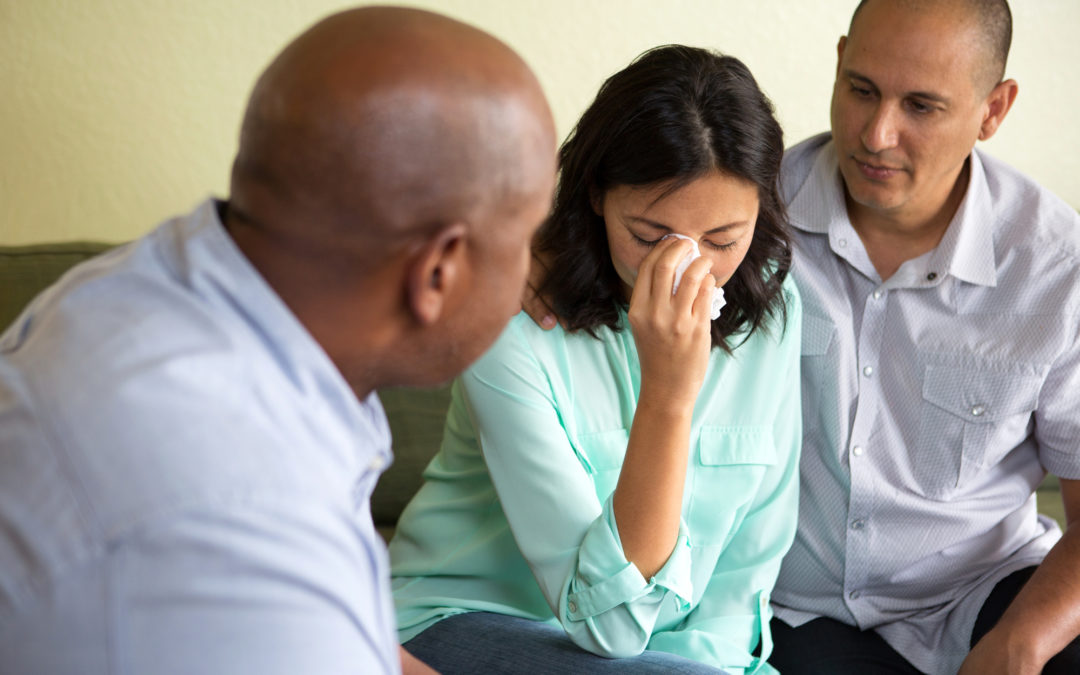
by Willow Oak Therapy Center | Jul 15, 2021 | Couples Counseling
According to the American Psychological Association, couples counseling is more than 75% effective. If you are considering marriage therapy, this statistic proves benefits that many couples already know. Professional counseling works.
But, marriage therapy isn’t only intended for couples on the brink of divorce. Whether you are newlywed or just celebrated an anniversary milestone, each chapter of your life presents new challenges and events. Therefore, marriage therapy helps you reconnect, pinpoint your issues, and strengthen your bond for the future.
But how do you know when counseling is necessary? What are some tell-tale signs? Read on to learn everything you need to know.
Lack of Listening
You tell your partner about the long workday or share plans for the upcoming weekend. Did they hear you? Lack of listening is a common issue in many relationships.
But when simply not hearing turns into ignoring or lack of interest, this could indicate the need for counseling. This is particularly true if you have noticed a shift in your partner’s listening attention and interest or if you feel emotionally ignored in the current relationship.
Financial Stress
Are you struggling financially? Does your partner tend to overspend while you consistently save? These are common financial stressors that could affect the health of your marriage.
If you find yourself arguing or worrying about money frequently, you may benefit from marriage therapy. In relationships, money can reveal where we assign value. A therapist can help you understand where your partner is coming from and address the route stressor of your financial concerns and issues.
Poor Communication
Communication and listening go hand in hand. But strong communication skills are arguably one of the pillars for strong and lasting relationships.
If you and your partner are not communicating or lack steady communication, this could signal a need for marriage counseling. Poor communication comes in many forms and could impact each couple’s relationship in a different way.
For example, you may feel your partner doesn’t confide in you or tell you about the details of their day-to-day work or personal life. Or, you may feel conversations are one-sided and you are never able to express concerns, worries, or interests in conversation. Healthy communication is open, transparent, and honest.
Evaluating Communication Patterns and Behaviors
Communication is one of the most challenging aspects of a relationship. If you are struggling with poor communication, professionals like Willow Oak Therapy Center can help. They focus on the “client” as the couple.
And, the psychotherapy center will address communication patterns and help you better understand your reactions to stressors. This will help strengthen your personal communication skills and dialogue as a couple.
Addiction
If you or your partner struggle with addiction, you could benefit from marriage counseling in addition to other forms of therapy or group work. Addiction has the power to destroy a person’s personal and professional life. But, this tragic circumstance can also wreak havoc on marriage and family life.
Couple’s therapy will help you develop the skills to tackle and overcome this addiction a couple. You may view your partner’s addiction as a calculated assault on your marriage.
Or, you may lack the emotional awareness to understand the deeper routed issues at hand. An experienced couples’ therapist will help you see each other beyond the addiction and learn to heal together.
Insecurity and Low Self-Esteem
While marriage therapy addresses the couple, an individual’s own insecurities and low self-esteem may affect the entire relationship. Whether you struggle with weight or worthiness, a couple’s therapist can help you sort through these issues. If unaddressed in your relationship, these emotional ruts can cause a larger divide and communication issues down the line.
Life Changes
As a couple, and as individuals, you may have experienced major life changes. For example, the birth of your children undoubtedly changed your family’s dynamic and future. Or perhaps, a job promotion or layoff impacted your financial outlook.
Or, a cross-country move could weigh heavily on your relationship. Life changes are emotional and could indicate the need for marriage therapy. If you are struggling to manage and overcome these changes together, you could benefit from the help of a professional.
Preparing for the Future
Instead of stressing over the future or lamenting the past, a therapist will help you work through these changes in the present moment. It is common during hard times to assign blame or withdraw.
A therapist will help you faces challenges together. This will strengthen your marriage bond and prepare you with a sharp set of tools to tackle any future issues.
Infidelity
Did you know that more than 40% of married couples have been affected by infidelity? If you struggle with infidelity in your marriage, know that you are not alone. Emotions around infidelity may include guilt, shame, anger, rage, and general unhappiness.
You may feel the need to lash out at your partner or blame yourself during these trying times. But, managing these emotions on your own can quickly become isolating and overwhelming. That’s where the professional guidance of marriage therapy can help.
A therapist will help you unpack these emotions and clearly communicate your feelings to one another. This will create a calm space to foster real growth and help build trust again.
Missing Intimacy
A lack or change in intimacy could indicate the need for marriage therapy. If you are no longer intimate with your partner or have noticed a shift in your intimate relations, there may be more serious issues beneath the surface.
And, intimacy is not just physical. Your relationship should also welcome emotional intimacy; this relates to strong communication habits.
Marriage Therapy Could Strengthen Your Relationship
If you are considering marriage therapy, you do not have to experience shame or feel alone. As couples evolve, they may grow apart or together. A marriage therapist will help you address your issues as individuals and as a couple so that you can continue to grow together if that is what you hope for.
These are some of the signs that could indicate issues in your relationship. If you have experienced any of these issues or have questions about marriage counseling, contact Willow Oak Therapy. The center will walk you through the intake process, address fees and insurance, and much more.

by Willow Oak Therapy Center | Jun 14, 2021 | Couples Counseling
Are you still hesitant about going to marriage counseling? Well, this might comfort you; according to the American Psychological Association, around 75% of couples who go to therapy see an improvement in their relationships afterward. Counseling isn’t only for couples who are on the brink of divorce. It can also be for those with milder struggles who want advice from a professional. Many advise couples to go to therapy even before they think they need it. Still not yet convinced? Here are some benefits of marriage counseling you can get.
Improve Your Communication
Many couples don’t know how to communicate effectively. The main reason is that each individual has different ways of communication.
Some people, for example, like facing issues head-on. Yet, others might prefer to ignore them instead. Certain issues might be a big deal to some yet a small matter to others.
This creates problems because both sides feel unheard and, sometimes, unloved. Marriage counseling helps you learn a communication style that works for both of you.
Communication is key in a successful relationship. Both sides have to learn how to express their feelings, thoughts, wants, and needs. Both sides have to learn how to listen, too.
You’ll learn how to communicate respectfully with each other from marriage counseling. This is why around 98% of couples are content with counseling. It gives you the tools you need for dealing with your marital problems.
Develop a Closer Relationship
In many cases, couples go to therapy because they’ve grown apart. All the conflicts they’ve had might have created space between them, creating more misunderstandings and mistrust.
Marriage counseling gives couples a good environment for communication. As you sort through your relationship problems, you may begin to feel like a team again. You can start building trust and creating more good memories again.
Laying yourself bare to your partner can help you become closer. You may begin reliving those feelings of closeness you once shared at the start of your marriage, especially if your therapist advises you to spend more time with each other.
Deepen Intimacy
One of the most underrated benefits of marriage counseling is increasing intimacy. It can either be emotional or physical intimacy.
Sex is an important part of a relationship because it ignites the passion you feel toward each other. The number of times you become intimate may dwindle over time. Still, you shouldn’t resign yourself to marriage without passion.
Marriage counseling can help you find out the cause of your lack of intimacy. It can then help you find ways to reignite your passion in your relationship.
Learn How to Compromise
Many conflicts are due to having different opinions and views on things. As you go on through marriage, you’ll encounter issues where you might not stand on the same side. It can be about parenting, politics, finances, or even smaller things like what color you should paint your interior wall.
Compromising is the answer to these issues. If you’re having issues in this aspect, counseling will help you with that.
Of course, you should have already worked out major issues that can break a marriage, like whether to have children or not, where to live, and whatnot. For other issues, you can still work through them; you only need to learn how.
Uncover the Root Cause
Marriage counseling doesn’t only look at the current conflict. It digs deeper into each individual to figure out the root cause of the conflict.
Our past still has a hold on our present. Our thoughts, behavior, and feelings are the consequences of our past. For some people, their past affects everything in their current life too much.
Intimacy issues, for example, might stem from an abusive childhood. Some marriage issues can be a product of one’s past.
Counseling can help you pinpoint what’s fueling these issues. Once you find out, you can then take the right steps to heal.
Heal Old Wounds
There’s no relationship wherein you have not hurt each other, whether intentionally or unconsciously. What matters, however, is how you overcome such instances as a couple.
That’s where some problems come in. One might still be hurting over an old wound, while the other is already way past it. That’s the deal with some wounds; they may remain to be painful even as time passes by.
Marriage counseling can help the couple work through these wounds together. When healing comes, the couple can move forward together with no one left behind in pain. A good therapist can help you leave your past issues, resentment, and anger in the past.
Set Priorities and Goals as a Couple
Another area that might create arguments is the set of priorities for each person. One person might be putting their partner as a top priority, while the other is focusing on their career.
When you go to counseling, you may have to discuss your priorities. Having different ones might be the cause of your many conflicts.
You’ll get a chance to examine your priorities as an individual and a couple. You can then choose to re-arrange them so you can be as one with your partner. But, if both of you have your relationship very low on the list, then you might want to re-examine your marriage instead.
Promote Self-Growth
More often than not, you have to grow as a person to meet the needs and demands of a successful marriage. Marriage counseling can help you with personal growth.
Even if the sessions focus on your relationship, you’ll also learn more about yourself at the same time as learning more about your partner. You’ll learn what skills you need to work on to improve your relationship, for example.
Some pieces of relationship advice you can get out of counseling can translate into other areas of your life, as well. You might realize that your overall life has improved aside from your relationship.
Get the Benefits of Marriage Counseling Now
One thing to remember is that both participants have to be willing to reap the benefits of marriage counseling. You must both put effort into understanding and communicating with each other. If one isn’t willing, then no amount of counseling will help.
Don’t worry; your partner might only need a little more time to prepare. When you’re ready to get counseling, feel free to contact us today.

by Willow Oak Therapy Center | May 3, 2021 | Couples Counseling
According to the American Association for Marriage and Family Therapy, there’s been a fifty-fold increase in qualified family and couples counselors since the 1970s.
More in-depth research, greater professional legitimacy, and less discrimination for couples seeking treatment have contributed to the field’s growth. Recent record-low divorce rates indicate that more people than ever before are accessing couples therapist services.
Whether you’re married or cohabitating, the issues faced and the need for help is often similar. As you and your partner start down the relationship therapy path, you will discover things about each other that will help you create positive change in your relationship.
Prepare yourselves for the challenging yet ultimately rewarding journey ahead. Review some of the questions you can expect from a couples therapy session.
1. Why Did You Choose to Undertake Couples Therapy?
In most cases, attending couples therapy requires the consent and agreement of both individuals in a relationship. However, each person may have their own reasons for agreeing to go to counseling.
Most people book a couples counseling meeting for the following reasons:
- Managing nontraditional partnerships
- Sexual problems
- Concerns over social media or digital technology use
- Unfaithfulness and trust issues
- Premarital therapy
- Family counseling (such as blended families)
A therapist will typically ask each of you to discuss these reasons because it highlights key issues you face in the partnership and your desire to stay in the relationship. If you didn’t want to go to couples therapy or feel forced into attending, it’s unlikely you see value in maintaining the relationship.
2. Do You Trust Your Partner?
While love, romance, laughter, and respect are all advantageous attributes in a relationship, the crucial factor for success is whether or not two people can trust each other. Trust may be eroded due to infidelity, addiction, dishonesty, unrealistic expectations, or other less logical causes.
Whatever the reason, the best couples therapist will ask you this particular question to establish whether this is an area that needs to be worked on.
Repairing a relationship damaged by a lack of trust takes considerable time. Displaying a desire to re-establish trust is an excellent first step, but your counselor will need to dig deep into the dynamics of your partnership. Be prepared for challenging questions and strategies designed to help you and your partner rebuild some common ground.
A loss of trust is cited as one of the core drivers of marriage breakup. Your therapist likely has a lot of experience dealing with this issue.
3. How Happy Do You Feel in this Relationship?
It’s not rocket science to work out that most people want to live a joyful life. One 2020 study of people from 42 countries showed that almost 70 percent of respondents rated happiness as “extremely important.”
But what does being happy mean in the context of a relationship? According to the same report, it meant everything from stability, pleasantness, and safety to material wealth, comfort, and psychological well-being. Happiness, it seems, is subjective, so the answers to this typical therapy question tend to vary wildly from person to person.
Your therapist will explore your respective levels of happiness in your partnership to determine your reasons for wanting to stay together. Are you codependent–relying on one another in an unhealthy way? Perhaps you remain together simply because you’re too scared to leave the comfort of something familiar.
But in the best cases, a couple may rekindle that ember of happiness they felt when they first got together and explore ways to help it burn bright once again.
4. Where Do You See Your Relationship In the Future?
It’s essential to understand whether you see eye to eye on your future or if you see any future at all. Even if your goals align, you must want to achieve those aims in tandem. A couples counselor will help you recognize your position and create strategies to work towards your desired future.
Your therapist might also ask you to use a weather metaphor to describe your relationship, something like “What is your forecast for the future?” Do you see your relationship as a sunny day or a cloudy one? Or is there a tornado on the way?
These kinds of questions couch a serious subject within a more approachable one. Your answers will allow your counselor to predict the extent of the damage inflicted on your partnership and how easily you see it repaired. As with the weather, there’s always the chance of sunshine as each new day dawns.
5. What Do You Wish Your Partner Did More?
A lack of communication is cited as one of the leading causes of conflict in couples. Often this lack of communication is exacerbated by one or both members of a couple not feeling satisfied with the other’s level of participation.
Often what people think of is “nagging,” neediness or anger is a way, albeit ineffective, of an attempt to communicate those wishes. Your therapist will ask key relationship questions to help you to express your desires in a non-judgemental, safe space. And your partner is far less likely to put up barriers or respond habitually.
6. Are Your Expectations for Intimacy Being Satisfied?
Relationship issues are sometimes the result of a mismatch in each partner’s levels or type of intimacy. Does your partner always say no when you ask for sex? Do the experiences that turn them on something you find unappealing?
Both people in a relationship are entitled to satisfaction, both romantically and sexually. Sexual incompatibility can lead to frustration, arguments, and tension, whereas an in-sync sex life is emotionally satisfying and has numerous health benefits.
Your therapist will explore reasons for any mismatch. They will give you and your partner the chance to discuss your feelings to harmonize your sex life.
Choosing a Couples Therapist For Your Situation
An experienced couples therapist can help you and your partner redefine your reasons for being together. It’s a valuable option for couples with a wide range of issues: from recovering from cheating to building better communication strategies and everything in-between. Finding a clinic you can count on is the first step to regaining that lost trust and love.
Are you Googling “couples therapist near me” due to relationship hardship? Contact Willow Oak Therapy today to discuss whether a session is the right step for you and your partner.

by Willow Oak Therapy Center | Apr 7, 2021 | Child Therapy
Are you a parent wondering why your child seems so nervous in social situations?
You might have asked them directly about how they feel, but they refuse to open up about it. Do you know the best ways to alleviate social anxiety in kids?
The coronavirus pandemic poses a mental health crisis for ages across the board. While the loneliness and isolation of online schooling have taken a toll on some children, others have found relief from social anxiety. Have you considered how overwhelming it is for these youngsters to return to school?
If you want to help a child cope with social anxiety, you need to consider psychotherapy. We’re going to explain how therapy treats anxiety, tell you what to look out for, and explore coping strategies. Read on to learn what you need to know!
Social Anxiety vs Shyness
How do you know if your kid is an introvert vs social anxiety?
Suffering social anxiety disorder (SAD) rises above being shy. Children who suffer from social anxiety have a preoccupation with being negatively evaluated by those around them. This keeps kids with anxiety away from the activities that they love because they’re scared of being laughed at or criticized.
This disorder is characterized by severe worry over how their actions are outwardly perceived.
While more commonly diagnosed as a teenager, social anxiety sometimes starts earlier. Without prompt detection and treatment, kids may become depressed and isolate themselves away from friends and family.
Performance-anxiety is the main manifestation for some sufferers. Anxiety may surface during group presentations, sports events, or musical auditions.
Generalized social anxiety may appear in any social event where a child must act alone.
Fears and phobias may develop that center on the situation that the child worries about. This can lead to avoidant behavior or a complete refusal to participate or engage with others. As a result, it can be hard for kids with social anxiety to talk to their peers and foster friendships.
How to Spot Social Anxiety
The disorder typically presents with trembling, blushing, and sweating. During an anxiety attack, a child may be breathless, dizzy, and lightheaded.
They may also have a fast heart rate and may experience nausea or stomach aches. Tense muscles are another sign that your kid is experiencing social anxiety. They may say that their mind has gone blank during any interactions that occur in public settings.
If your child worries excessively about what they will say or do in an upcoming situation, this may well be a clue. Such fears could lead to emotional outbursts when facing the event that they’ve been dreading.
Because some kids bottle up how they feel, it may be harder to spot their true emotions.
It’s thought that both nature and nurture play a part in this disorder. Some experts have noticed that there is a higher degree of prevalence in kids who have a close blood family member who also suffers from social anxiety. External factors may also play a role, including life experiences both in and outside the family home.
A child’s personality may already overlap with some aspects of the disorder, making it more likely that they will go on to develop social anxiety.
How to Help Kids With Anxiety
Deep breathing exercises are an effective strategy for overcoming an anxiety attack.
A good way to teach a kid about deep breathing is to have them blow up an imaginary balloon. This will slow a racing heart and relieve SAD symptoms like dizzy spells and lightheadedness. During breathing exercises, it’s even better for a child to close their eyes and in their head, picture themselves within a relaxing environment.
Another technique that can relieve tension is to relax different muscle groups one-by-one, in sequence.
Have the child start by clenching their hands together into fists for a few seconds, then loosening their grip slowly. You can also achieve this with other parts of the body, particularly those that are the tensest in the first place. You can also relax the arms, feet, legs, neck, and shoulders by using a similar technique.
A child can also be encouraged to engage in relaxing activities or creative hobbies, such as art, music, and writing.
You may think that because your child is relaxed during online schooling, there’s no need to seek treatment right now. Without treatment during the pandemic, however, a child with social anxiety is more likely to suffer very severe symptoms when they are back at school.
Social Anxiety Treatment Plan
Social anxiety disorder treatments are geared-towards reducing anxiety so that the sufferer can face situations again without fear.
Medications often play a role, but cognitive-behavioral therapy (CBT) and family therapy can be just as powerful.
Managing symptoms is an important element to recovery, and effective techniques are often taught during therapy sessions. These techniques may include problem-solving, social, and academic skills training. Your therapist may even share these techniques with the child’s parents or teachers so that they can assist them in coping better.
During social anxiety therapy sessions, a child will also learn how to set goals and challenge themselves. This can help them overcome the disorder.
Social anxiety support groups may also be very helpful for your child. Ask your therapist if he or she can put you in touch with one within your community.
Cognitive reframing can be used to identify and change patterns that arise in certain situations. Ideas, thoughts, or emotions can be challenged, and by looking at them differently, ultimately changed. The mental health of a child suffering from social anxiety can be improved when the polarity of these self-beliefs is flipped from negative to positive.
Social Anxiety in Kids
We’ve shown that social anxiety in kids can be hard to identify if the child refuses to discuss their feelings. Don’t let your child suffer in silence.
If you’re a parent, teen, or adult with social anxiety, we can help. We are a psychotherapy center located in Rockville, MD, and we are dedicated to providing affordable and accessible psychotherapy. We tailor our services to the individual needs of our clients.
Contact us today to schedule an appointment.

by Willow Oak Therapy Center | Mar 18, 2021 | Therapy
Everyday life comes with its challenges and problems and no matter how hard we try to move past them, the pressure can take a toll on our mental health.
According to the National Institute of Mental Health, millions of people in the U.S. suffer from mental health problems. Only a half of them will seek professional help.
When left unaddressed, these issues can interfere with normal functioning. This leads to reduced work productivity, lower happiness levels, and increased irritability.
Depending on the issue you may have and your openness to the therapy experience, you can try different approaches and kinds of therapy.
Read on to discover the most important reasons to see a therapist and start improving your mental health today.
Therapist vs. Psychiatrist: Main Differences
Before you seek therapy, it’s important to distinguish between a therapist and a psychiatrist so you can choose the best option for you.
A therapist deals with mental health symptoms and helps you manage your life, relationships, and stress better. They’re licensed to perform therapy and use different techniques and methods. However, they’re not medical doctors so they cannot prescribe medication.
A psychiatrist treats people with mental health disorders. These include clinical depression, schizophrenia, addiction, anxiety, OCD, PTSD, bipolar disorder, and eating disorders. They have a medical degree, which means they can prescribe medication.
You can also find relief for some mental health disorders by talking to a therapist in addition to a psychiatrist. They’ll help you learn useful ways and tools to manage the symptoms.
Anxiety and Depression
One of the main reasons people seek therapy is because of anxiety and depression. These two disorders often go hand in hand and can be difficult to manage on your own.
Anxiety is more than just a feeling of stress as the person suffering often feels like the world is crumbling and they are overcome by a sense of doom. Thoughts are racing and are often negative so the body feels tense and prepared to fight or flight, especially during a panic attack.
Depression is on the opposite spectrum and is a result of various factors. The person suffering feels hopeless, constantly sad, and unable to do everyday tasks such as bathing, leaving the house, or making the bed.
Dissatisfaction With Life
If you feel unhappy with life for no “apparent” reason and are not sure where your problem comes from, you might be wondering what to expect during therapy.
The therapist will ask you questions and based on your answers, they’ll determine the best strategy to help you. They’ll also discover the root of your unhappiness.
It’s important to be completely honest with your therapist in order to make the most out of your sessions. For therapy to be successful, you should not hide things or lie about things. No matter what your problem is, a good therapist won’t judge you or make you feel bad or guilty about what you’re going through.
Work-Related Problems
Work-related stress, workplace bullying, or a highly-demanding job can be a reason for you to seek therapy. If you’re unhappy with your job, boss, or co-workers, this dissatisfaction will affect your productivity.
One of the most wonderful benefits of seeing a therapist is to discover what you want from your job and your career. Your therapist can help you gain the confidence to go after your dreams and stand up for yourself in the workplace.
The same goes for school-related stress and the pressure to fit in, especially for elementary school students and teens in high school. Whether the stress is a result of getting good grades, bullying, peer pressure, or physical appearance, these feelings are valid. They need to be addressed before they do more damage.
If you’re a parent of a child struggling with depression, anxiety, stress, or behavior problems, it’s important to seek therapy for them right away. This will help them go through this stage much easier so they can understand themselves and their environment better.
Relationship or Marital Problems
One of the most common reasons for going to therapy is marital problems or relationship problems. Couples who fight a lot, don’t spend enough quality time together or are considering divorce can benefit from couples therapy.
In couples therapy, you and your partner will both attend the sessions, but may also attend some sessions individually. The therapist will give you tools and tips to communicate better and start mending the relationship in a healthy way.
Grief and Loss
Grief after the loss of a loved one is an extremely important reason to see a therapist. If you’ve been wondering when to see a therapist after loss, it’s best to schedule an appointment as soon as possible.
Dealing with grief is a process and you’ll likely go through different stages as time goes by. Therapy can help you process your emotions in a healthy way so you don’t get stuck and unable to move forward.
Low Self-Confidence
Whether you’re a teenager or an adult, low self-confidence and self-esteem can be an obstacle for you to enjoy life to its fullest. Luckily, this is something you can improve with the help of a trained therapist who will help you realize your worth and fulfill your potentials.
Together, you’ll uncover the reasons behind your lack of self-confidence. You’ll learn coping mechanisms and change your thoughts. You’ll discover and develop your unique talents and build your self-esteem in a healthy way.
Is Therapy for You? These Important Reasons To See a Therapist Will Help You Decide
Whether you’re a parent of a child with behavioral problems or you just want to manage your mental health better, these are the most common reasons to see a therapist.
If you’re not sure if therapy will work for you, it’s best to schedule an appointment and take it from there. In most cases, people who go to therapy enjoy many physical, mental, and emotional benefits and improvements.
Ready to take your mental health into your own hands? Discover our therapy services and learn which therapy is the right choice for your needs.






